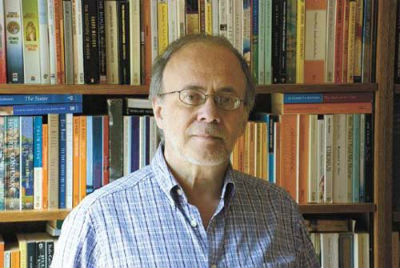Is God Green? Thinking Local, Not Global
By Neil Earle
 Richard Bauckman
Richard Bauckman“Carbon emissions are central to our modern way of life,” theologian Richard Bauckham told an audience at Loma Linda University in California some time back. He is “up” on such realities as happenings in the Arctic as a bell-wether for climate change.
What is this? A noted theologian with a Green agenda?
Yes, indeed. Bauckham is the distinguished emeritus Professor of New Testament at St. Andrews University in Scotland and author of the well-received “Theology of the Book of Revelation.” His interest in Revelation fuels his conviction that the book pictures a group of churches in spiritual resistance to the idolatries of the First Century A.D. (page 161).
The Roots of Hubris
Idolatry – there it is. Bauckham deplores the hubris of 21st century society with its too confident stance that nature can be circumvented or “rearranged.” While some blame Christians across history for using Genesis 1:28 and the “subdue the earth” text as a cultural mandate to plunder the planet, Bauckham sets forth two other dubious players:
Those Mighty Microbes
“… these creatures make up most of the organisms and species on earth…the voracious caterpillars of an obscure moth from the American tropics saved Australia’s pastureland from the overgrowth of cactus …a Madagascar weed, the rosy periwinkle, provided the alkaloids that cure most cases of Hodgkin’s disease and acute childhood leukemia…another substance from an obscure Norwegian fungus made possible the organ transplant industry
…a chemical from the saliva of leeches yielded a solvent that prevents blood clots during and after surgery
…Wild species also enrich the soil, cleanse the water, pollinate most of the flowering plants. They create the very air we breathe. Without these amenities the remainder of human history would be nasty and brief.”
– Edward Wilson, Harvard etymologist
- The Enlightenment Idea of Progress being always undeniably good
- The Technological Agenda
Bauckham sees, as do many critics of modern industrial society, how the fascination with the Scientific Method articulated around the time of Francis Bacon (1561-1626), has led to the belief that the advancing human species could effect a virtual independence from Nature. Fast forward to 1991 when William Thompson warned in The American Replacement of Nature of effects generated by the new 24-hour news cycle, namely, subtly giving us the illusion of a world under human control. “If it’s Sunday, it’s Meet The Press.”
But this is an illusion, quickly shattered for those who experience hurricanes, tornadoes and earthquakes or the 2 million dead in China from a heedless drive to build…and heedlessly pollute. “The Genesis account, rightly read, shows that we humans are an intrinsic part of the natural world,” cites Bauckham. “God blessed all the creatures in Genesis One and we are part of that.”
“All Creatures Great and Small”
This important Old Testament insight into biodiversity means that all creatures have a value in themselves and are not to be seen primarily as there for exploitation or plunder. “One third of the prescription medicines we depend upon are found in plants and fungi living especially in tropical zones.” (See Box.) Bauckham cites Psalm 104:24, “O Lord, how manifold are thy works! In wisdom You have made them all. The earth is full of your possessions – this great and wide sea in which are innumerable teeming things, living things both small and great…and there is Leviathan which you have made to play there.”
For Bauckham, the God who delights in His creation – all of it – looks askance at a feverish technological drive that has hunted the great whales to near-extinction and literally scraped and scoured the mighty Grand Banks cod fishery into near oblivion.
But Bauckham worries that the same technological imperative that led to the ongoing ecological catastrophes will bedevil desperate human attempts to correct the problem. Already scientists are speculating about shooting sulphur dioxide into the atmosphere in order to reflect the sun’s rays and lessen global warming. “This amounts yet again to transforming the very air we breathe,” says Bauckham. “And who decides what temperature would fit humanity best?” These issues make us realize that some “smart” solutions could be worse than the disease.
The Modern Idolatry
Such seemingly “advanced” thinking Bauckham sees as inherited from the Progress-at-all-costs heritage of Enlightenment philosophers such as Voltaire and Rousseau aiming for a man-made Utopia at all costs! This has led to our breakneck technological drive to transfrom anything in the natural world that stands in our way. To both Bauckham and Thompson this psycho-spiritual affliction shows up most glaringly as “consumerism.” Bauckham draws direct parallels between consumerism and what the Bible calls “idolatry.” Consistent Biblical calls to live within our limits, to moderate some of our unworthy desires – represented by such figures as Saint Francis and Mother Theresa – is foundational to Bauckham’s Christian approach to environmentalism.
 Grew them myself!
Grew them myself!He sees four parallels between consumerism and idolatry in an effort to motivate Christians to get beyond the “living larger and larger” mentality.
First, Consumerism makes the Limited supreme. “I just gotta have this new (fill in the blanks).” Every moralist and economist seems to know that consumption only satisfies up to a point. Christian teachers know that the “hook” in idolatry has always been trying to satisfy what are really spiritual desires through physical means. The sex rites of Mighty Aphrodite or Ishtar were part of the ancient appeal for an “enhanced experience” (Jeremiah 5:7-8). Today we “sell the sizzle not the steak” – an advertising mantra that applies, perhaps, to the delirious freedom promised by technology.
Bauckham calls this fascination “misplaced transcendence” – giving to physical possessions and experiences the veneration due only to the Creator. Yet temporary fixes never work. Ultimately you have to come home from Club Med. This leads Bauckham to wonder if the purpose of economic growth hasn’t become just economic growth itself. By contrast, rather than viewing men and women for “target marketing” Christianity at best offers a vision of what human life is really for – living for something and Someone larger than self. “I am the Bread of Life,” he quotes Jesus. “He who comes to me shall never hunger, and he who believes in Me shall never thirst (John 6:35).”
Second, Consumerism seems to treat human desires as if they were unlimited. The constant offering of ever-new objects distracts from such basics as, “What is my life all about?” Today, human wants can be delivered quickly across ever-more sophisticated supply chains. One commercial claims “we take the waiting out of wanting” Flat-screen TVs make TV’s distracting powers even more attractive even though the programming quality seems to have flattened out long ago. Bauckham deplores a marketplace haunted by the fear that needs might be underfinanced, hence the reckless extension of credit which helped bring the financial system to its knees in 2008.
Enslaving Deceits
Thirdly, consumerism like idolatry is enslaving. We’re always on the treadmill to acquire more. Advertisers long ago started selling intangibles such as success, power, relaxation, status, excitement, personal attraction to boost their wares. Coffee-houses sell “atmosphere,” sports palaces sell excitement along with high decibel rock music. These escapist trendencies challenge the spiritual mandate to live for worthier values. Misplaced transcendence, again. If a new after-shave or a new dress can secure status then who needs God? Yet the Bible insists that a person’s life and real value doesn’t consist in the abundance of material goods (Luke 12:15).
Much-neglected is the God-given mandate to tend and nurture the earth, what Christians call Stewardship (Genesis 1:26), opposed to the break-neck heedless exploitation.
Fourthly, consumerism is deceitful. The market is God and Advertising is its Prophet. We fall for false promises which “outflank our sense and judgment.” They penetrate beyond cool reason to head straight for our emotions. “You owe it to yourself,” “Have it your way.” “The Good Hands people.” “A new YOU in 60 Days.” “A fixation with new objects postpones the proper orientation of human life,” argues Bauckham. What does he mean by that? What is the Christian orientation in a consumer culture that seems at times to have no purpose but to perpetuate itself?
A (Local) Christian Alternative
For Bauckham, tapping into the long tradition of Christian moderation is a guard against the runaway forces of consumerism aided and abetted by endless technological innovation. These he sees as threatening the planet.
But wait! Why go so far afield? Saving the planet is a mighty big aim. Rather than engage in such totalizing endeavors which so easily lend themsleves to media hysteria and political manipulation, why not think locally? Christian colleges already proclaim some days for “digital diets” – 24 hours for students and faculty to unplug. Step out of the busy rat race to scan what is actually happening to our immediate environment. Does the mining company really need to level that mountain? What happened to that bike trail I used to like? Is that a waste plant setting up near the children’s playground? Why is that stream I used to like full of litter? What is city council planning next?
Such questions might help counteract green fatigue and mobilize support for doing what we can, where we are, with what we have, right there in our own backyard. Rather then thinking of saving the planet maybe we can improve our own neighborhood. The Bible’s wisdom is too often neglected and it exacts a price sooner or later: “Purify your hearts you double-minded…Come now you rich, weep and howl for your miseries that are coming upon you” (James 4:8, 5:1). The year 2008 stands as a warning.
Employing “green time-outs” can help reorder our desires, refocus our priorities, says Bauckham. We might escape the hectoring from the “nightly business report” and the fake electronic “now.” And just maybe we’d enjoy life a lot better once we sort out more deeply what it should be all about.
